
Something strange happened to the late Freddie Mercury on the way to the big screen. First, the Zanzibar-born Brit of Persian descent started to look a lot like Mr. Robot’s Emmy-winning Egyptian-American star Rami Malek wearing a fake overbite. Second, his lifelong hang-ups became sex, drugs, rock ‘n’ roll, and … a girl.
If we are to believe Bohemian Rhapsody, which is up for five Oscars at the February 24 Academy Awards, the bisexual rock legend spent most of his adult life pining for his girlfriend-turned-ex Mary Austin, even years after their split. According to the film, there must have been something extra about Mary. Throughout his numerous dalliances with men (mostly offscreen) and his final relationship, with Jim Hutton, movie Mercury secretly longs for a white-picket-fence life with her.
If you tilt your head to a certain angle, Rhapsody’s narrative has much in common with its fellow Best Picture Oscar nominee A Star Is Born, only Mercury assumes both the Bradley Cooper and Lady Gaga roles: dead man walking (and singing) and supernova in flight. (Incidentally, the artist formerly known as Stefani Germanotta got her stage name from the 1984 Queen song “Radio Ga Ga,” which is included in the Live Aid sequence that ends Rhapsody.)
Despite its award-season clout, some have excoriated the film for its depiction of Mercury’s love life. Professional critics and social media’s armchair ones accuse it of whitewashing his sexuality in favor of something more palatable (i.e., straight) for the masses that have made it the highest-grossing musical biopic of all-time ($212 million in North America and still counting).
How about we take this to the next level?
Our newsletter is like a refreshing cocktail (or mocktail) of LGBTQ+ entertainment and pop culture, served up with a side of eye-candy.
In a year in which LGBTQ characters can claim unprecedented representation among the Best Picture Oscar nominees (The Favourite, Green Book, Can You Ever Forgive Me?, and Vice all feature pivotal LGBTQ roles), Rhapsody’s heterocentric storytelling is particularly disappointing.
It’s like watching a movie about Aretha Franklin that glosses over the making of “Respect.” Sex and gay culture informed so much of who Mercury was onstage, but the movie seems to want us to believe they were mostly fodder for his performance art. Malek’s Mercury comes across as curiously asexual.
To be honest, I was personally less vexed by Rhapsody’s straight bias than I was by its crooked timeline. What was Queen doing performing “Fat Bottomed Girls,” a song that wasn’t released until 1978, in the mid-’70s? And could Queen possibly have written “We Will Rock You,” an anthem that charted in 1977, after they went to number one in the U.S. with “Another One Bites the Dust” in 1980?
By the time Live Aid was turned into an AIDS confessional, I’d already thrown up my hands and surrendered. Did Mercury’s doctors initially diagnose him with AIDS, as the film implies when he tells his Queen bandmates backstage, “I’ve got it,” meaning AIDS, not HIV? The two are not synonymous, which feels like a straight movie’s oversight. Any self-respecting LGBTQ film should understand that an HIV diagnosis typically precedes the onset of AIDS. But then, the only truly authentically gayish things in Rhapsody are the Queen tracks to which Malek lip-syncs and the sequence that recreates the making of the band’s “I Want to Break Free” video.
Perhaps a more well-rounded rendering of Mercury’s personal life would have enthralled me to the point of overlooking the chronological shortcomings. Mercury’s lust for men sent Mary Austin packing, so it had to have been a far more dominant sexual orientation than presented in the movie, which is as tentative about gay sexuality as its version of Mercury is. We see him exchanging furtive glances with men, flirting with them, even pecking a few on the lips, but for someone with such an oversized persona, his sexual passion is strangely muted onscreen.
A Star Is Born, a quintessential straight romance, has more vivid LGBTQ flourishes, including the casting of gay icon Lady Gaga and setting the pivotal when-Jackson Maine-met-Ally scene in a drag club with queens swanning about fabulously. Meanwhile, its sexist, doomed take on heterosexual love is not exactly a ringing endorsement, no matter how intensely Gaga gazes into Cooper’s eyes as they melt their way through “Shallow.”
Roma, another Best Picture nominee, doesn’t have any openly gay characters, but it offers an equally bleak view of heterosexual relationships, with both of its Oscar nominated actresses playing women betrayed by the men in their lives. If only they’d met someone as devoted to them as Rhapsody’s Mercury is to Mary.
Even the movie’s offscreen narrative favors heterosexuality. Director Bryan Singer was fired before filming wrapped due to frequent absences from the set, and if we believe the hearsay, he had a contentious working relationship with his straight male lead. Singer retained a directing credit, but his firing was strike one against him as a potential openly gay Best Director Oscar nominee.
Strike two: more notoriety and legal hassles for Singer due to new accusations of sexual assault against him by various men. The charges led to GLAAD’s rescinding of Bohemian Rhapsody‘s Outstanding Film nomination at this year’s Media Awards. Strike three.
Malek, meanwhile, gained a Golden Globe, a SAG award, a BAFTA, and a Best Actor Oscar nomination (alongside A Star Is Born’s Cooper and At Eternity Gate’s Willem Dafoe, he’s one of three category hopefuls who played tortured, doomed artists). He also snagged a real-life girlfriend in Lucy Boyton, the British actress who played the object of Mercury’s romantic obsession.
Freddie Mercury doesn’t get the girl in the end, and that, not his career misfires or being diagnosed with HIV, seems to be the great regret of his life in Rhapsody. Surely it won’t win Best Picture over Roma, The Favourite, and Green Book, but a more balanced view of Mercury’s private life probably wouldn’t have made it any less of a contender.



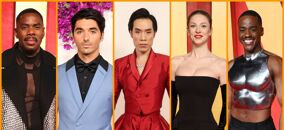


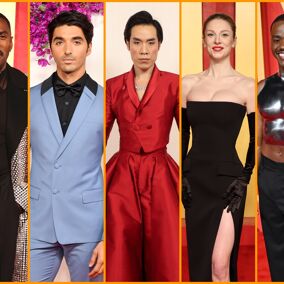

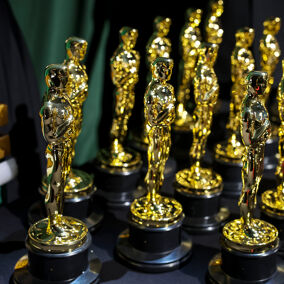

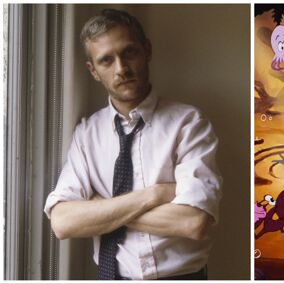

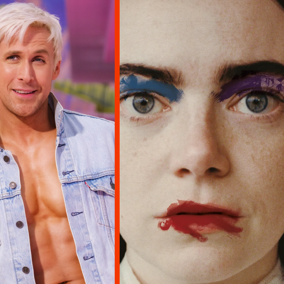
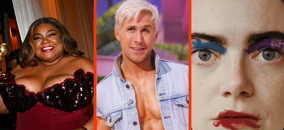
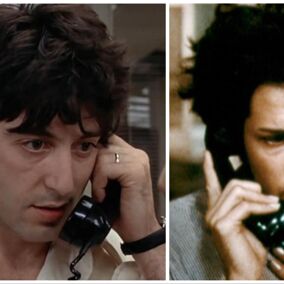



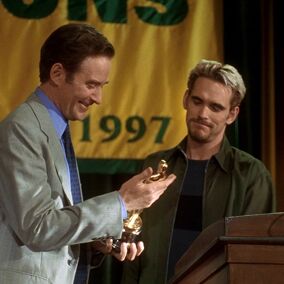

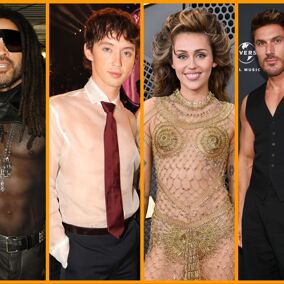























MikeE
Re: one of your complaints: When Mercury was diagnosed in 1987, the term “HIV” was barely a year old at the time, having been coined in May 1986. The term “HIV” was not yet widely used, and at that time, most people with an HIV diagnosis had already moved on to AIDS. So yes, his saying he had “it” and meaning AIDS, is correct.
ca_rickf
The first term given the medical condition was GRIDS: Gay Related Immune Deficiency
THAT acronym placed the stigma on the disease which American and British and the rest of world societies succumbed to – which is why the disease has a gay stigma attached to it 35+ years later.
MuslimSlutBox
In America in the mid 80’s it was called HTLV1 or HTLV2. I don’t remember the difference. Meanwhile the author’s concern about the difference between HIV v AIDS is probably more about himself and his own health and anxieties than it is about the movie or the article. Keep the viral load low dude and you’ll never get AIDS. You’ll be okay if you take your meds.
BigFloridaBear
As for someone who is a huge Queen fan, seen several documentaries on Queen and Freddie, and old enough to have lived through this, you really needed to do some research before ranting. Mary was Freddie’s attempt to be straight and although they were not compatible at all sexually, they were extremely close friends their entire lives. There is a documentary that talks about this. In the documentary Freddie in his own words explains their relationship as well as his diagnosis and going public with his status and why he waited to tell the world. As for complaining that Rami Malek didn’t look enough like Freddie, Freddie clones were out of stock in Hollywood and it’s a f***ing movie! In the future you may want to critique children’s birthday parties instead of things adults go to.
@NYCBear
I am a huge Queen and Freddie fan
GentlemanCaller
Oh for goodness’ sake, Queerty, Bohemian Rhapsody was plenty gay. Just because they failed to show Freddie blowing somebody in the loo doesn’t mean the movie was straightwashed. And as others have pointed out, at the time there wasn’t much distinction between HIV and AIDS: it was all the mysterious Gay Cancer. History matters, even if it doesn’t fit your precious millennial victim narrative.
james7
I REALLY HATED THE MOVIE. LIP-SINGING TO FREDDIE MERCURY’S SONGS IS NOT GREAT ACTING. IMAGINE HOW THE FOLKS FROM ‘A STAR IS BORN”, WHO DID ALL OF THEIR OWN SINGING, FEEL WHEN THEY HEAR THAT SOMEONE BASICALLY MOUTHING THE WORDS TO FREDDIE’S RECORDINGS IS DOING “GREAT”.
GregR
I personally think this is overly harsh. Did I love it? No but I don’t think it was horrible. Beyond that, I agree with the argument that some folks can never win when it comes to the portrayal of homosexuality. For years, many have argued, they want a character to exist outside of his/her sexuality, i.e. it is there but not the central part. Freddy was clear during his lifetime that he was primarily interested in the music and connecting with fans. So I think they have achieved that balance a bit in this film. Yes, they portray him as first having the girlfriend but slowly realizing he is really gay. They show him going into bathhouses and they show the start of the relationship with his partner Jim at the end of his life. Also, they had the very touching scene when he connects with the kid with AIDS. Do people really want more sex scenes in a film that was supposed to be primarily about the life of a band?
Now, was all of this accurate? No, many liberties were taken. But frankly, I think they were more frank about his sexuality than expected for a major worldwide release that has to please a whole lot of folks. We enjoy depictions of gay intimacy and relationships but much of the world audience shuns it. I thought this movie does a good job of opening the door to the reality while still being subtle about it. Frankly, I expected a much worse whitewashing, with Mary being the main squeeze for 90% of the film.
And in the 80’s, people were not great about the nominclature for things. I find it plausible Freddy, certainly not an HIV/AIDS expert, would express himself to his bandmates in this way.
Again, the movie has many flaws and the retconned reality bugged me. But it is hardly as queerophobic as people make it out to be. It was a band-approved bio-pic intended for the worldwide audience, it was going to be sanitized some.
And the whole Singer comments are silly. He was missing huge amounts of work and clashed with the star. Everything I’ve read is that the firing was warranted, regardless of the orientation of the director.
dash_board1
“Singer retained a directing credit, but his firing was strike one against him as a potential openly gay Best Director Oscar nominee.”
So much for Queerty research, Singer did an interview with one of the big gay magazines (I think it was OUT) where he made it quite clear that he is bisexual, not gay.
OzJosh
The gay-erasure of Bohemian Rhapsody is way worse than the completely distorted focus on his romance with Mary. Sure, they were lifelong friends and stayed close even after he came out, but Mercury lived with Jim Hutton for considerably longer than he was with Mary, yet Hutton is relegated to standing on the sidelines as Mercury continues to pine over Mary, years after their relationship is over. It’s insulting to Hutton, and a serious misrepresentation of Mercury’s life and true feelings. Then there’s the way the film not only glosses over Mercury’s wild years, but turns them into a moral judgement about promiscuous gay sex as it cuts to a weary Mercury in Berlin lamenting all the shallow, empty sex. That wasn’t Mercury’s attitude at all; that’s the writer imposing his own values and judgement and pandering to a straight audience. Nobody expects a mainstream biopic to include graphic depictions of the subjects sexual escapades, but let’s at least be at least vaguely accurate about who the guy was and what he thought and felt.
JessPH
I am more disappointed with the previous Oscar Best picture nominee The Imitation Game and how it didn’t give enough story to Alan Turing’s homosexuality and how the British government’s homophobia ruined him. Just like Mercury, he is one of the greatest icons of the 20th century.
Terrycloth
When i see Rami Malek as Freddie Mercury i see Rami with a mustache and a wig.he looks nothing like Freddie. Hes much too skinny especially during the live aid set..plus they didnt get rid of the brown circles under his eyes..movie was so so .But Oscar worthy ? Hardly..yet it won.i bought the soundtrack ill pass on the dvd.
gab1991
1st ACT : Freddy is a straight singer who is going to marry a girl his band becomes huge overnight
2nd ACT: Freddy is tempted by evil homosexuality, becomes a drug addict, alienates his band and betrays them, gets AIDS.
3rd ACT: Freddy fights the evil homosexuality, gets in a heternormative awkward relationship that could be just a friendship, but at least he is now less open about it since he should be ashamed, he still loves the girl forever and ever and all is forgiven and we get terrible crowd VFX, terrible Editing (for anyone who actually knows about film), terrible shots, and probably the whole concert was directed by someone other than Singer.
Bohemian Rhapsody will hopefully be considered by future generations who are smarter as one of the most homophobic films to have existed, just like we now know that Birth of a Nation is racist bs.